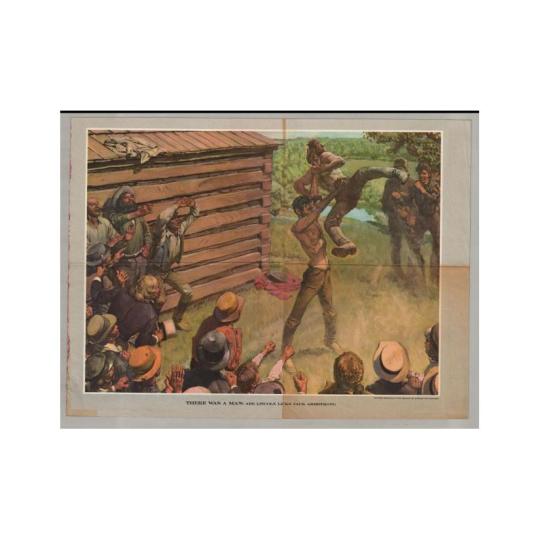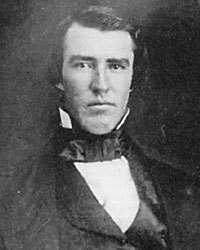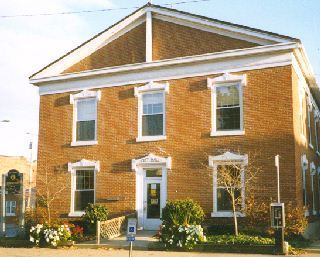#lincolnhistory
Explore tagged Tumblr posts
Text
Fightin' Words: Abe, the Armstrongs, and the Life Changing Almanac
It’s a fun fact, the kind that comes out during parties, trivia games, or just in casual conversation. “Hey, did you know Abraham Lincoln is in the National Wrestling Hall of Fame?” As odd as it may sound, it is partially true. Before he became one of the most important figures in American history young Lincoln was many things, a self-taught student, rail-splitter, and a boatman to name a few. But, one of the biggest turning points of his life came to him as a young clerk where a simple show of athletic prowess would tie him to a murder trial decades later.
By 1831 Lincoln was living in New Salem, Illinois and working as a clerk in a grocery store owned by Denton Offutt while studying law. He was only twenty-two years old but the six-foot-four-inch tall Lincoln had developed a reputation for being a formidable wrestler with an undefeated string of wins in the catch-as-catch-can style of hand-to-hand wrestling. This type of reputation spread quickly in the rough and tumble town of New Salem, and it caught the ears of The Clary's Grove Boys, a nearby gang of men who spent their days drinking, fighting, pranking people, and spreading a general storm of rowdiness wherever they traveled. Offutt was continually impressed by his new employee, openly bragging about how Lincoln was mentally and physically superior to any of The Clary’s Grove Boys and that he could easily take any of them down in a fight. The Clary’s Grove Boys heard the claim loud and clear and their “champion” Jack Armstrong was up for the challenge.
The accounts of the fight between Abraham Lincoln and Jack Armstrong vary depending on the source. Some accounts say that the battle lines were drawn clearly between Lincoln and Armstrong while others say that Lincoln bet Armstrong ten dollars that he could find a man who could beat him and on the day of the fight no one showed leading to Lincoln calmly stating “Look here, Jack, my man isn’t here yet, but rather than lose that ten dollars I will wrestle with you myself.” Armstrong was no small opponent, but he had no idea who he was tangling with when he locked arms with Lincoln. Given his reputation as being a bully the entire town came out to see the brawl and the two men exchanged blows and grappled with each other, each unable to pin the other to the ground but with Lincoln clearly having the upper hand. Accounts say that at one point Lincoln grabbed Armstrong by the neck and held him at arm’s length while shaking him, laughing as other members of The Clary’s Grove Boys struck his legs with zero effect. There is an unclear picture as to who even won this fight, but what is known is that at the end of it a battered and bruised Armstrong shook Lincoln’s hand and declared "Boys, Abe Lincoln is the best fellow that ever broke into this settlement. He shall be one of us."

Print "There was a Man: Abe Lincoln Licks Jack Armstrong" by Harold von Schmidt for the July 1949 issue of Esquire Magazine. Image via www.lincolncollection.org.
The fight with Armstrong changed Lincoln’s entire persona in New Salem, making him a beloved and well-respected figure in the town. He became a voice of reason to the hijinks of The Clary’s Grove Boys, sometimes stepping in as mediator and diffusing disagreements before they came to blows. He also got his first taste of leadership, later being appointed as captain of the local militia unit and moving on to serve in the Black Hawk War. Perhaps the most surprising outcome was the bond between Lincoln and Armstrong who became extremely close friends after their brawl. As years went on Lincoln was welcomed into the Armstrong family home of Jack and his wife Hannah and he would often stay there both for friendly visits and when he found himself without work. When Jack and Hannah welcomed their son William into the world in 1833, Lincoln would often rock the baby to sleep during his visits. No one in the room could have predicted how their paths would cross one day.

Jack Armstrong. Image via http://www.mrlincolnandfriends.org/
Lincoln’s career in politics and law continued to grow steadily over the next decades but while Lincoln was building his fabled career in law the twenty-four year old William “Duff” Armstrong found himself on the other side of it. In August of 1857 a religious camp meeting held in Mason county Illinois was winding down after multiple days of congregating. On August 29th 1857, the night before the meeting was to officially conclude, Duff and some others were spending time around the whiskey wagons and they decided to sample the goods. After drinking heavily Duff lay down on a bench to sleep off the effects of the alcohol and he was left alone until approximately 8pm when a local farmer by the name of James P. Metzker rode his horse into the vicinity. Metzker was also intoxicated and he made the fateful decision to grab the sleeping man’s leg, spit in his face, and drag him to the ground waking the sleeping beast of Armstrong and causing the two of them to get into a heated brawl. According to Duff’s brother, A.P. Armstrong, the two men eventually stopped throwing fists and decided to have some more drinks together. He goes on to state that after this friendly exchange Metzker proceeded to get into another fight with another man that was drinking with them named J.H. Norris. Eventually Metzker left the scene on his horse, falling off several times in the process but eventually making it home. The only three that truly know what happened that night are Armstrong, Norris, and Metzker, but two days later Metzker was dead, having succumbed to two fractures to his skull that doctors concluded could not have come from him falling off his horse. The Mason County Sheriff arrested both Norris and Armstrong for the murder of James P. Metzker.

William "Duff" Armstrong. Image via hd.housedivided.dickinson.edu.
Armstrong was facing certain peril. Accused of cold-blooded murder alongside Norris, who had already escaped jail for a murder charge once before, the outlook was bleak. While awaiting trial in jail his father Jack Armstrong died but the man had a deathbed wish, he wanted to call in a favor from his old friend, the young attorney Abraham Lincoln, and ask that he defend his son in court. Hannah Armstrong wrote to Lincoln and his response was swift:
“I have just heard of your deep affliction and your son's arrest for murder. I can hardly believe that he can be capable of the crime alleged against him. It does not seem possible. I am anxious that he should be given a fair trial at any rate, and the gratitude for your long-continued kindness to me in adverse circumstances prompts me to offer my humble service gratuitously on his behalf.”
Lincoln packed his bags and traveled to Beardstown, Illinois ready to defend the man he once rocked to sleep as a baby in the battle for his life.

The Beardstown Courthouse where the Almanac Trial took place still standing today. Image via abrahamlincolnonline.org
The trial began on May 8th 1858 and the charges against Armstrong and Norris were grim, the indictment stating the Norris struck Metzker in the back of the head with a large piece of wood before Armstrong struck him in and around the right eye with a “slung-shot”, a metal weight held in a long strip of leather, causing “mortal bruises” that lead to his death. The prosecution greatly rested on the words of Charles Allen, a man who claimed he witnessed the assault and knew it was Armstrong and Norris because he could clearly see them by the light of the full moon overhead. It may have seemed like and open and shut case, Norris had a criminal past and Allen clearly saw the men attack Metzker. But then it was Lincoln’s turn to speak.
Up until this point Lincoln sat quietly in the courtroom, “with his head thrown back, his steady gaze apparently fixed upon one spot of the blank ceiling, entirely oblivious to what was happening about him, and without a single variation of feature or noticeable movement.…” When the time came for him to cross examine Allen, Lincoln had very specific questions for the star witness. When asked for details about that night Allen repeatedly insisted he saw it all happen from approximately 150 feet away, the brutal scene being lit by the full moon overhead “about where the sun would be at one o’clock in the afternoon.” Lincoln asked more questions, pressing him about the location and time of the crime over and over again. The camp meeting was taking place in a very densely wooded area that was quite dark at night. Lincoln joked, did Allen have a candle with him in order to see? But the witness persisted that he saw it all happen clearly in front of him and that his certainty was fully placed in what he saw under the light of the bright full moon. He was given every opportunity to change his words.
When Lincoln was satisfied that Allen was given a proper chance and that he had made himself clear about the moon lighting his view of the crime, he submitted into evidence an almanac that contained information about the night the assault occurred. The defense was swift and crushing. The pages of the almanac contained a wealth of information, including the position and phase of the moon the night of August 29th 1857 and it simply did not match the account of the witness. The volume was inspected by the court, the attorneys, and by Judge Harriott all of which confirmed the information on the page, at the time of the assault the moon was no where near a position to be illuminating the scene. Rather than being directly overhead as Allen stated, Lincoln said the moon was in fact setting, which would have left the scene amid the heavy forest in significant darkness, certainly not illuminated brightly enough to see the distinct faces of Armstrong and Norris.

Lincoln for the Defense painted by Norman Rockwell in 1962 depicting Lincoln during the Duff Armstrong trail. Image via https://www.lincolnshrine.org/
Everything the prosecution had deflated within moments as members of the jury and some in the courtroom burst into laughing. Judge Harriott commented that Lincoln was wrong about one thing, that according to the almanac the moon would have been coming up at the alleged time instead of going down as he stated. Lincoln’s response was simple, “It serves my purpose just as well, just coming up or just going down, as you admit it was not over head as Mr. Allen swore it was.”
With a simple turn of a page all credibility of the prosecution was destroyed. Lincoln had other evidence including a doctor stating the injuries to the front of Metzker’s face were the result of the blow to the back of his head, but it did not matter. The almanac sealed the deal in the minds of many present in the courtroom. As the jury went into the jury room Lincoln approached Hannah Armstrong and told her that her son would be “cleared before sundown”, a prediction that quickly came true. Within an hour the jury unanimously voted to clear Duff Armstrong of all charges.
After being reunited with his mother and getting a talk from Lincoln about how he needs to care for his mother and become the man his father was Duff Armstrong went on to live a long life, dying on May 5th 1899 at sixty-six years old. Norris, the man who allegedly inflicted the blow to the back of Metzker’s head, was convicted and this time he was unable to avoid jail. He was sentenced to eight years in a state penitentiary.
“The Almanac Case” became on of the most well know chapters in the law career of Abraham Lincoln and was even used in campaigns against him during his senatorial race and his later run for the presidency where opponents alleged that he used an altered almanac to keep his old family friends safe. Lincoln became the sixteenth President of the United States just two years later in 1860. He was honored by the National Wresting Hall of Fame with the Outstanding American Award in 1992. Today, visitors to the National Wrestling Hall of Fame can visit the Lincoln Lobby with a mural showing the famous brawl between Lincoln and Jack Armstrong that would lead to a lifelong friendship and save Armstrong’s son only two years before Lincoln became President of the United States.
*************************************************************
Sources:
Lincoln's Defense of Duff Armstrong by J. N. Gridley.
Journal of the Illinois State Historical Society (1908-1984), Vol. 3, No. 1 (Apr., 1910). https://www.jstor.org/stable/40194333
True Story of the Almanac Used by Abraham Lincoln in the Famous Trial of Duff Armstrong by Duncan Ferguson.
Journal of the Illinois State Historical Society (1908-1984), Vol. 15, No. 3/4 (Oct., 1922 - Jan., 1923). https://www.jstor.org/stable/40186950
Abraham Lincoln and the Case of the Altered Almanac by Mel Maurer
The Cleveland Civil War Roundtable, 2006.
“Duff” Armstrong Trial: 1858 Encyclopedia.com.
By the Light of the Moon: Abraham Lincoln's Adventure in Forensic Meteorology (Part 1) By Matt Soniak. Mental Floss.com Sep 13, 2011.
Is Abraham Lincoln in the Wrestling Hall of Fame? By Dan Evon. Snopes.com May 3, 2018. https://www.snopes.com/fact-check/lincoln-wrestling-hall-of-fame/
#husheduphistory#featured articles#history#AbrahamLincoln#LincolnHistory#legalhistory#famouscrimes#famouscourtcase#IllinoisHistory#weirdhistory#forgottenhistory#strangehistory#thefarmersalmanac#themoon#JackArmstrong#Getbywithalittlehelpfrommyfriends#historyclass
4 notes
·
View notes
Photo

original url http://www.geocities.com/lincolnhistory/ last modified 2007-12-27 08:29:41
7 notes
·
View notes
Photo

#1970 #Nu #NuChapter #NuChapterAlphas #Sphinx #SphinxMen #Charterers #BloodyNu #LincolnUniversity #Lincoln #LincolnPride #LincolnPA #AlphaPhiAlpha #Alphas #1906 #06 #AlphaHistory #LincolnHistory #HBCUHistoryISBlackHistory #AlphaHistoryISBlackHistory #APHIA1906 #APhiA06 #APhiA #APhiA110 #Nu1912_Alphas @nu1912_alphas @bukworm1906 @thariddla03
#hbcuhistoryisblackhistory#1906#aphia06#aphia110#nu1912_alphas#bloodynu#lincolnuniversity#1970#sphinxmen#alphaphialpha#charterers#06#lincoln#lincolnhistory#alphas#aphia1906#lincolnpride#sphinx#nuchapteralphas#alphahistory#nu#nuchapter#lincolnpa#alphahistoryisblackhistory#aphia
0 notes
Photo

#Repost from @civilwarusa with @repost_freeapp. Thus, Abraham Lincoln and Mary Todd were married at the Edwards’ home on Friday evening, November 4, 1842. About 30 relatives and friends, all hastily invited, attended the ceremony which was conducted by Reverend Dresser who was wearing canonical robes. Mary wore a lovely white muslin dress. She wore neither a veil nor flowers in her hair. #LincolnHistory #AbrahamLincoln #HonoringLincoln
0 notes
Photo

#Repost from @civilwarusa with @repost_freeapp. May 18, 1860 - Abraham Lincoln is nominated to be the Republican candidate for President of the United States. He opposes Northern Democrat, Stephen A. Douglas, and Southern Democrat, John C. Breckinridge. In June, he writes a longer autobiography. #LincolnHistory #HonoringLincoln #MaryToddLincoln #AbrahamLincoln #usa
0 notes
Photo

#Repost from @civilwarusa with @repost_freeapp. November 8, 1863 photo by #AlexanderGardner #LincolnHistory #AbrahamLincoln #HonoringLincoln
0 notes